Can You Mix Creatine With Protein Powder?
Author:
Unlock your full potential by engaging with our experts and community! Have questions about your fitness journey or looking for expert advice on weightlifting techniques? Don’t hesitate — leave a comment below and Oleksandr Maksymenko will provide a personalized answer and insights to help you reach your goals.
Torokhtiy is reader-supported. Some links are affiliate links, and we may earn a commission at no extra cost to you. See our disclosure page for details.
So a question in your mind may be “can you mix creatine with protein powder?”. I do remember when I first started exercising. I did not know how and when to use my protein powder and creatine. I had this irrational fear that some kind of boogeyman side effect may come about from mixing them together.
With endless research on this question, I came to the conclusion that both of these products can be mixed. I gave it a go! There were no side effects and it only helped me towards my fitness goals.
If you find yourself in the same dilemma, we have highlighted all of the vital information that you should know about mixing these two products. To be specific, we have covered:
- “The guide to adding creatine to protein shake”
- “Creatine and whey protein: Should you take both?”
- “How to take creatine and protein right?”
Can You Mix Creatine With Protein Powder? ABSOLUTELY! Protein powder and creatine have their own mechanisms of action, which do not interact with each other when co-ingested. This means that they will both still work and you should not really have any major side effects, if any at all.
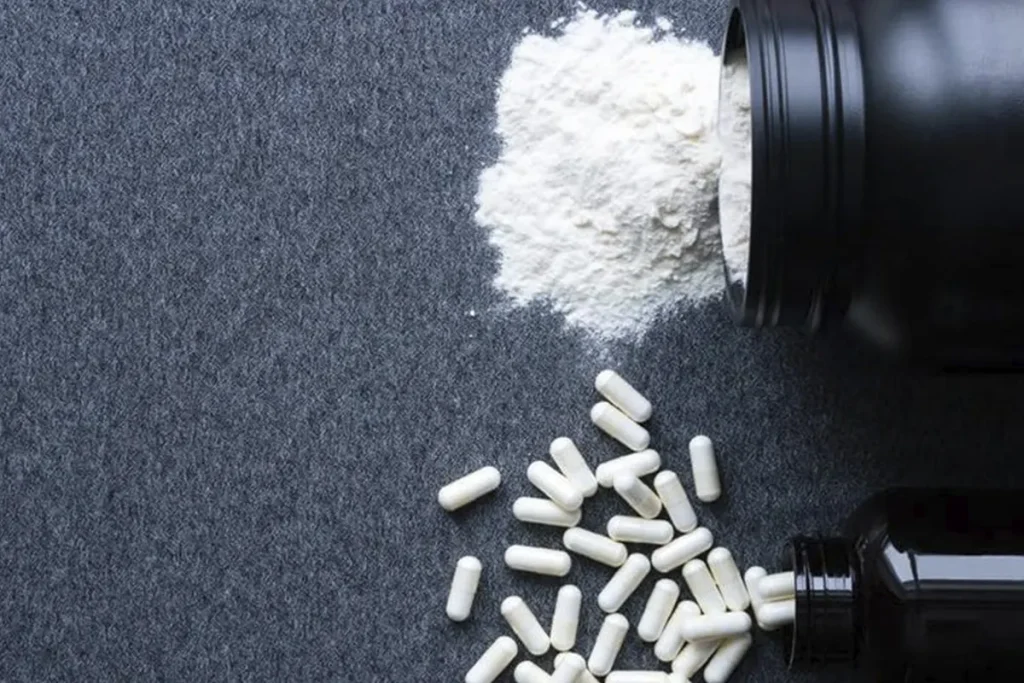
The Guide To Adding Creatine To Protein Shake
What is Protein Powder?
If we talk about protein supplements, one of the most popular of them is whey protein, which is basically the by-product of cheese production. It is put through a number of processes to create a powder form.
In terms of quality, whey protein is one of the most bioavailable forms of protein. It contains all 9 essential amino acids that are responsible for muscle protein synthesis (muscle building). Whey protein is very low in carbohydrates and dietary fats, therefore it is low in calories.
What’s most unique about whey protein is the concentration of leucine. It contains 11% leucine which means a smaller amount of whey is needed to get the same muscle building benefits of other protein sources.
Leucine is one of 3 branched chain amino acids which has shown to trigger something called mammalian target of rapamycin (mTOR). This is basically the central factor of protein synthesis, which tells the muscles to start building more proteins.
Without getting into too much detail, 20-30g of whey protein (with 2-3g leucine in such a serving) is enough to maximize the response of muscle protein synthesis.
Protein powders shouldn’t be a major safety concern if you buy them from well-known brands with a good reputation. If you don’t experience bloating, abdominal pain, or diarrhea after taking protein supplements, you can use them to meet your protein needs. And no, for healthy adults, a relatively high amount of protein in the diet is not harmful.
Recommended Protein Powder: Orgain Organic Protein Powder
Orgain has put together a great vegan protein blend!
It contains a blend of pea and rice proteins that complement each other in the context of limiting amino acids, as pea protein is low in methionine but high in lysine, while rice protein is the opposite. By combining pea and rice protein into a single blend, we get all 9 essential amino acids in needed ratio! This is exactly what you need on a vegan diet!
This protein powder contains 21 grams of protein, as well as 2 grams of dietary fiber, 240-270 mg of potassium and more than 6 mg of iron in one serving! Just so you know, dairy-based protein supplements don’t even come close to matching this vegan protein in terms of iron content! This Orgain protein also does not contain added sugar.
To top it off, Orgain products has saved:
- 30,000 lb of plastic (equivalent to 2000 gallons of crude oil)
- 580,000 lb of cardboard (equivalent to 49,000 trees)
- 884,000kg of reduced C02 emissions (equivalent to 192 cars taken off the road)
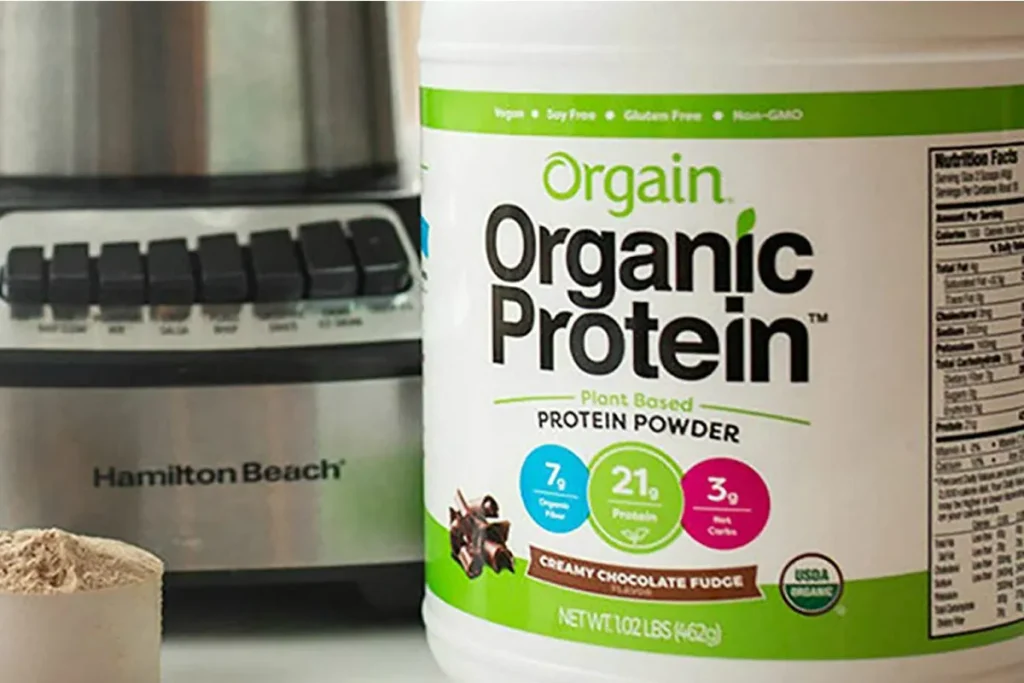
All and all, I really like this product and what the company stands for. Personally if i were to buy the product I would go for the chocolate coconut protein powder. Some users may not admire the taste of the chocolate coconut, it is the cheapest option. Flavor is not a priority for me. What would you go for?
What is Creatine?
Creatine is a combination of 3 different amino acids: glycine, methionine, and arginine.
95% of creatine is available in the skeletal muscles in a form of creatine phosphate and free creatine. Creatine phosphate is used to quickly restore an energy carrier ATP, which is used up very quickly during high-intensity exercise with maximal effort. Creatine monohydrate is used to saturate the muscle cells with phospho creatine. This can maximize high intensity performance.
Creatine reserves in the muscles are enough for 8-10 seconds of maximum effort exercises (i.e., sprinting, weightlifting, and powerlifting). However, this supplement can also increase training performance in exercises that last less than 30 seconds, especially when there are repeated bouts.
Creatine is naturally found in meat and fish, and a varied omnivorous diet can yield around 1g of creatine per day. However, in order to get the amount of creatine that will maximally saturate our skeletal muscles to increase high-intensity training performance and strength/muscle mass, we will have to eat a huge amount of meat and fish every day. After all, the effective dose for daily intake of creatine is 3-5 grams, and even more for athletes with a large amount of muscle mass. Therefore, taking creatine as a supplement is a great idea, especially considering that it is the most studied, safe for healthy people, and one of the cheapest supplements in the market!
You have an option to load creatine 20-25 g per day for 5-7 days. In practice, you should consume 5 grams of creatine 4-5 times daily. Then you need to ingest 3-5 grams per day to maintain the elevated creatine stores in skeletal muscles (although larger athletes may need to ingest as much as 5-10 g/day).
Another option is just to take 3-5g a day. In this way, the skeletal muscles will be saturated with creatine for about 4 weeks. However, in relation to exercise performance the effect of creatine will not be as noticeable, as with loading phase, until the reserves are saturated.
A study from the Journal of Strength and Conditioning Research looked at the effects of 26 days of oral creatine intake on bench press performance. The researchers found that compared to placebo, the use of creatine led to bigger changes in lean body mass, 3RM bench press strength, and total reps.
Recommended Creatine: BulkSupplements Creatine Monohydrate Micronized Powder
This one is truly a high quality micronized creatine product. Let me remind you that creatine monohydrate is the most researched and safest form of creatine available.
You could pick up the Bulk supplements creatine monohydrate for a reasonable price. The size of their containers range from 3.52oz-2.2lbs.
In all honesty, I feel that the smaller serving containers are not really worth going for. One serving from a 3.52 oz or 8.81oz package may be more expensive on a per serving basis compared to 1.1 pound and 2.2 pound packages.
Personally, I would go for the 1.1lb or 2.2lb packet to keep me going for a while. The only time I would recommend the smaller packers would be if it is the first time that you are trying out a creatine supplement and just want to see how your body, and especially, gastrointestinal tract, responds to it.
The BulkSupplements creatine is an unflavoured powder so it can be mixed in with your protein powder without affecting the overall taste. In general, if you want to buy proven creatine monohydrate without any additional ingredients, this product is what you need!
Creatine and Whey Protein: Should You Take Both?
Before you make your final decision, let’s weigh out the pros and cons to see if mixing creatine with protein is the right fit for you.
Pros:
- Reap the benefits of both supplements
- Possible increase in creatine uptake (as muscle creatine uptake is insulin mediated)
- May become habitual so that you do not forget to supplement with them
- Adding creatine into the mix does not change calories content
Cons:
- The creatine may affect the overall texture of the protein powder (possible appearance of crunching on the teeth)
- In some people, protein and / or creatine may cause bloating, discomfort, nausea and other symptoms in the gastrointestinal tract. Therefore, their simultaneous use can only worsen the situation. However, this is individual.
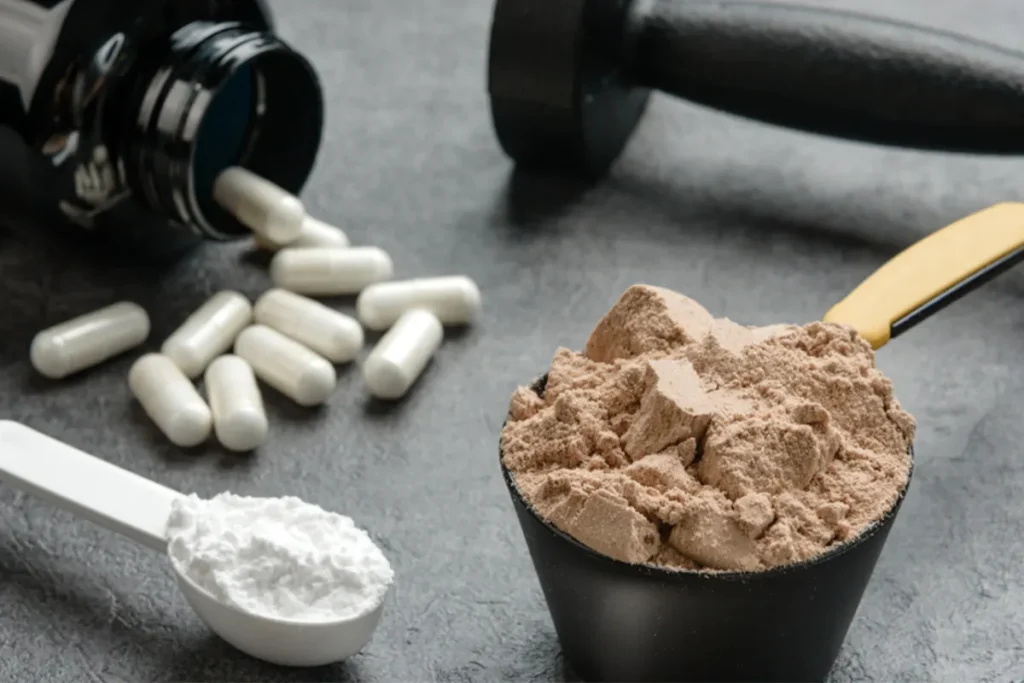
How To Take Creatine and Protein Right?
There are a few tips that you would need to consider if you have decided to mix both supplements. These include:
- ‘How to mix them together?’
- ‘When to mix them together?’
Tip 1: Mixing Creatine With Protein?
So I will give you my step by step ‘how to’ guide for mixing these powders together:
STEP 1: Get a protein shaker and fill 200-300 ml of water or milk
STEP 2: Toss in 1-2 scoops of protein powder, add a banana or berries to improve the taste and the absorption of creatine
STEP 3: Dash the needed serving of creatine in protein shake
STEP 4: Place a steel ball or mesh in the shaker to ensure it mixes properly
STEP 5: Screw the lid on top of the shaker and shake the content within the shaker thoroughly
STEP 6: After 10-15 seconds, set the shaker to stand for 10-20 seconds
STEP 7: Drink the protein shake with creatine
Alternative: Instead of following all of these steps, you could also just simply put water creatine and protein power into a blender. Then hit blend, before consuming.
Tip 2: When to mix them together?
In general you could mix and drink protein/creatine shake at any time of the day. This could be for breakfast, lunch, post workout etc. However some trials have shown that taking creatine post-workout may be slightly more effective.
So ingestion of creatine in protein shake post-exercise is reasonable advice and may help athletes establish a habit of postexercise nutritional intake. In this situation, if there are actually benefits to taking creatine post-workout, you will definitely use them.
FAQ
Can I Mix 5G of Unflavoured Creatine With a Whey Protein?
Adding 5g of unflavoured creatine in whey protein is fine. In fact, 3-5g is actually the recommended dose of creatine.
Can Creatine and Whey Protein Be Taken at the Same Time?
As we have mentioned multiple times, it is perfectly fine to have whey protein and creatine together.
Is Mixing Protein Powder and Creatine Dangerous?
Not at all! Both supplements are safe and there are no interactions that have flagged up from mixing creatine and protein together. If you have no problem digesting protein powder and/or creatine, or a combination of them, then you can safely consume them at the same time.
Conclusion
Let’s finish off by giving you a good take home message.
There is absolutely nothing wrong with mixing your protein and creatine supplements together. There are no negative interactions between them.
Protein powder is a great source of an additional serving of protein, which will help to stimulate muscle protein synthesis, whereas creatine helps with muscle creatine saturation and high-intensity performance.
Both can help improve exercise performance and body composition. Mixing and consuming the supplements together is simple, and probably best done after a workout.
Furthermore, the supplements are reasonably priced and low in calories.
Overall, we could say that there are many pros with very little cons, if any at all.
If you have made the decision to stack both of these supplements, check out our ‘favorites list’.
And that’s a wrap! Please feel free to share your thoughts or questions in the comment section below!
Also read:
- Muscle Milk vs Whey Protein
- Milk Protein vs Whey Protein
- Diarrhea After Protein Shake
- Protein Powder in Water or Milk
- Hemp Protein vs Pea Protein
- Pre Made Protein Shakes vs Powder
- Whey vs Hemp Protein
- Should You Drink Protein Shakes on Non Workout Days
- Best Strawberry Protein Powder
References:
- Effects of Amino Acids and their Metabolites on Aerobic and Anaerobic Sports // National Strength and Conditioning Association: https://journals.lww.com/nsca-scj/fulltext/2012/08000/effects_of_amino_acids_and_their_metabolites_on.8.aspx
- Effect of Oral Creatine Supplementation on Near-Maximal Strength and Repeated Sets of High-Intensity Bench Press Exercise // National Strength and Conditioning Association: https://journals.lww.com/nsca-jscr/abstract/1998/05000/effect_of_oral_creatine_supplementation_on.10.aspx
- Creatine // Australian Sports Commission: https://www.ais.gov.au/nutrition/supplements/group_a#creatine
Why Trust Us?
With over 20 years in Olympic weightlifting, strength training, nutrition coaching, and general fitness our team does its best to provide the audience with ultimate support and meet the needs and requirements of advanced athletes and professional lifters, as well as people who strive to open new opportunities and develop their physical capabilities with us.
By trusting the recommendations of our certified experts in coaching, nutrition, and sports training programming, as well as scientific consultants, and physiotherapists, we provide you with thorough, well-considered, and scientifically proven content. All the information given in the articles concerning workout programming, separate exercises, and athletic performance, in general, is based on verified data.
The product testing process is described in more detail here.
Author: Oleksandr Maksymenko
Certified Sports Nutritionist,
MSc Sports Dietetics
Specializing in: Weight management, Fitness / Sports nutrition
Oleksandr is a professional fitness nutritionist certified by the Fitness Professional Association (FPA). He follows the principles of evidence-based dietetics and fosters a healthy relationship with food in his clients, ensuring there are no strict prohibitions on their favorite foods or frequent lapses. His primary goal is not only to achieve results for you but also to sustain them over the long term, all while enjoying tasty and delicious food.



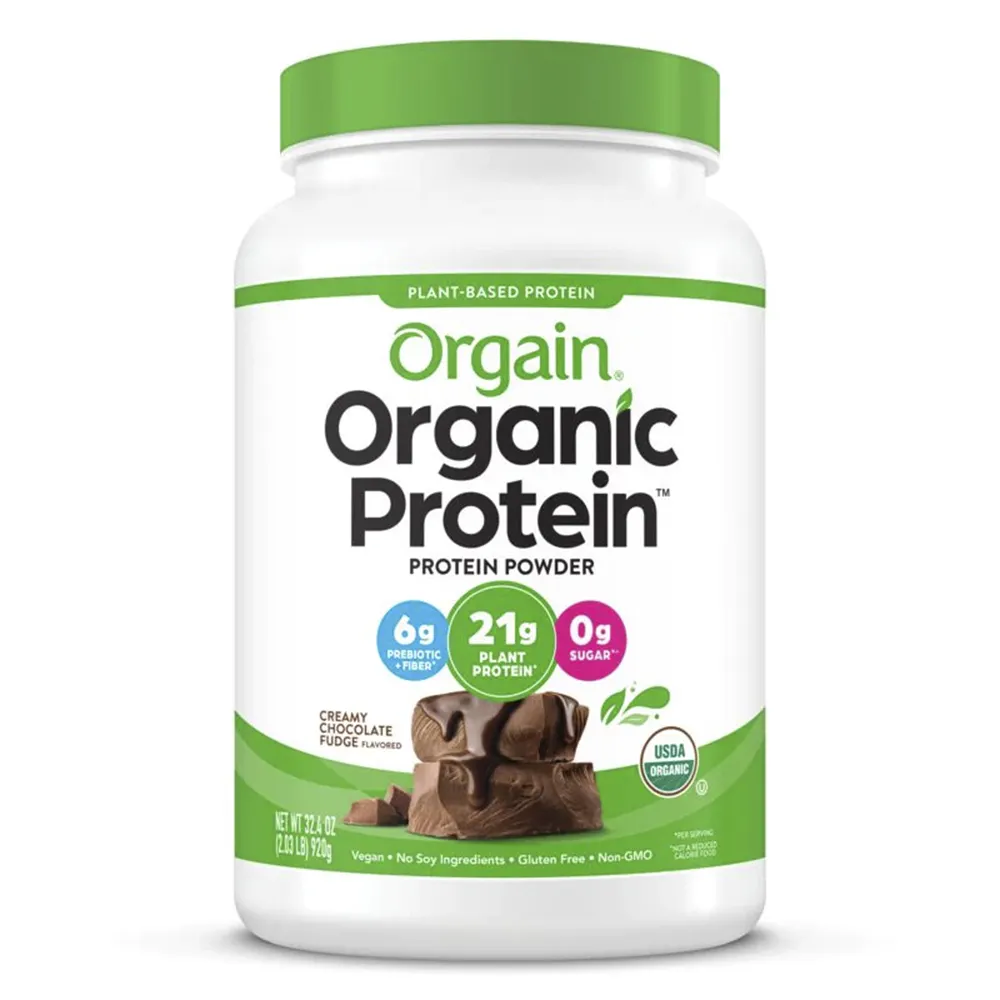
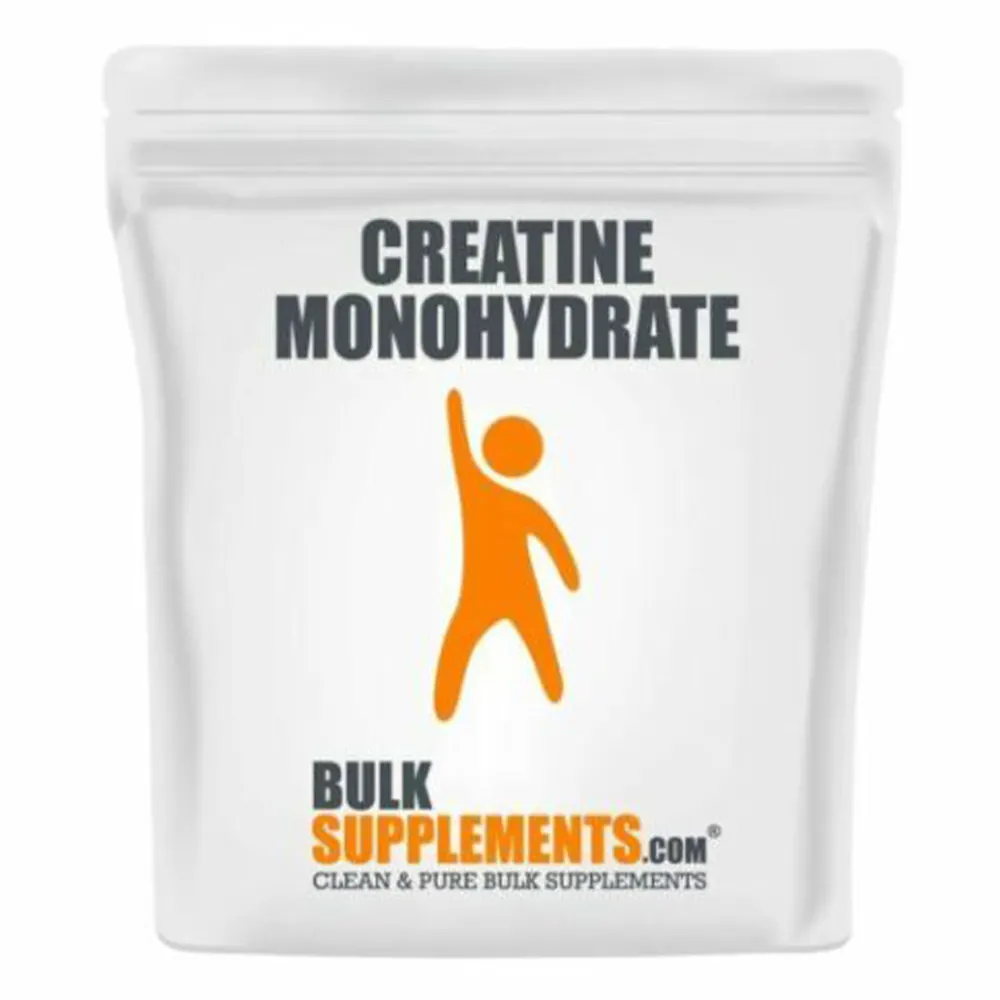
Still have questions after reading our article? Unlock your full potential by engaging with our experts and community! Don’t hesitate — leave a comment below and Oleksandr Maksymenko will provide a personalized answer and insights to help you reach your goals.